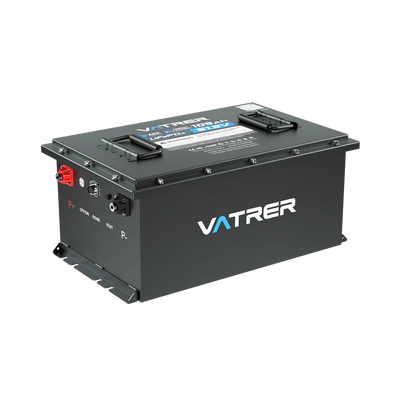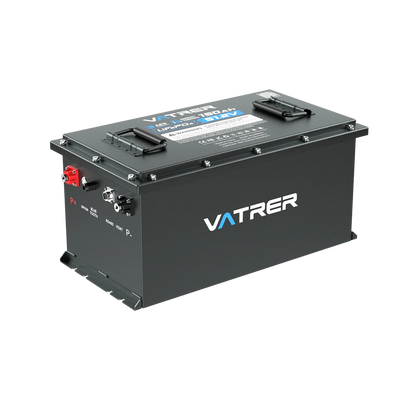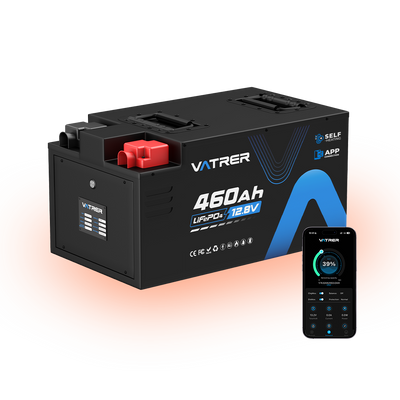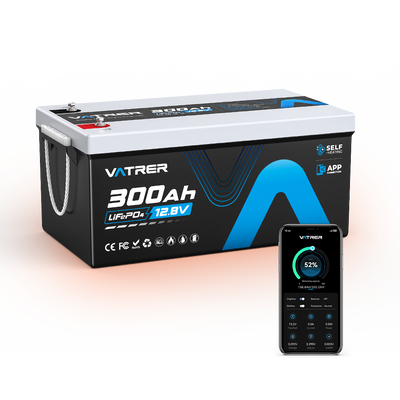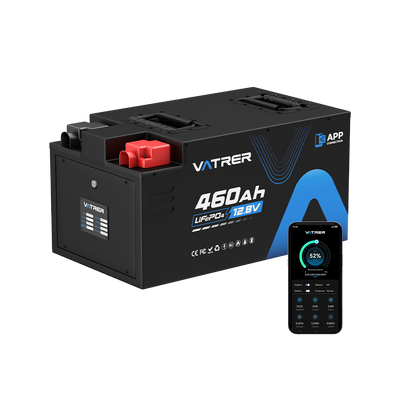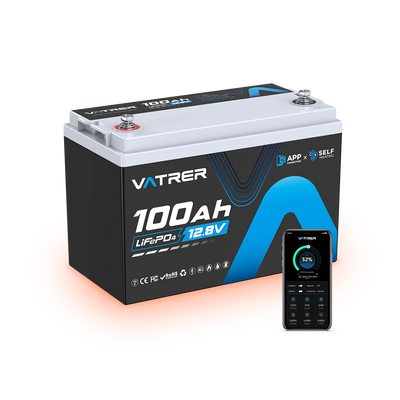How Many Lithium Batteries Do I Need for a 48V Golf Cart
Reading time 9 minutes
Golf carts are a fun and practical way to navigate the course, your neighborhood, or a campsite. If you’re considering upgrading to lithium batteries for your 48V golf cart, you’re likely asking, “How many lithium batteries for a golf cart do I need?” This question is critical for ensuring your cart—whether an EZGO, Yamaha, or Club Car—runs smoothly.
Generally, Lithium batteries offer significant advantages over traditional lead-acid batteries, but choosing the right number and type requires understanding your cart’s needs. In this guide, we’ll walk you through the essentials of powering your 48V golf cart with lithium batteries, covering configurations, selection factors, installation tips, and more to help you make an informed decision.

What Powers a 48V Golf Cart? Understanding Battery Basics
A 48V golf cart is an electric vehicle powered by a 48-volt battery system, ideal for golfing, community travel, or recreational activities like camping. Brands like EZGO, Yamaha, and Club Car use this voltage for a balance of power and efficiency, typically achieved with four 12V or two 24V batteries connected in series.
But please note that it is not recommended to use batteries commonly used in golf carts in series, because the voltage of each battery cannot be well balanced, which may easily cause problems such as power outages.
A standard 18-hole round may consume 3-6 kWh, depending on terrain and load, so choosing the right lithium golf cart batteries is key to meeting these demands. Unlike gas-powered carts, these rely entirely on batteries, making the shift to lithium a popular choice for improved performance and longevity.
Why Choose Lithium Batteries for Your 48V Golf Cart?
Switching to a 48V lithium battery setup offers clear benefits over lead-acid batteries, making them a smart choice for golf cart owners. Here's why lithium golf cart batteries, like those from Vatrer, are a great option:
- More Energy in Less Space: Lithium batteries have a higher energy density (150-250 Wh/kg vs. 30-50 Wh/kg for lead-acid), providing a longer range of 20-80 miles per charge.
- Lighter Weight: Weighing up to 70% less, they improve handling on hilly courses and reduce wear on your cart.
- Longer Lifespan: Last up to 10 years with 2-4 times the charge cycles of lead-acid batteries, which typically last 3-5 years.
- Faster Charging: Charge in 4-6 hours vs. 8-12 hours for lead-acid, meaning less waiting between rounds.
- Low Maintenance: Unlike lead-acid batteries, which need regular watering, lithium batteries are maintenance-free.
- Better in Extreme Weather: Perform reliably in hot or cold conditions, ideal for diverse climates.
- Eco-Friendly: They have a lower environmental impact when disposed of properly, making them a greener choice for your golf cart.
While lithium batteries have a higher upfront cost compared to lead-acid, they save money over time by lasting longer and requiring less maintenance. To help you see the difference, this table compares lithium and lead-acid batteries for a 48V golf cart:
| Feature | Lithium (Like Vatrer LiFePO4) | Lead-Acid |
|---|---|---|
| Energy Density (Wh/kg) | 150-250 | 30-50 |
| Weight (4x12V Pack) | 100-150 lbs | 300-400 lbs |
| Lifespan (Years) | 8-10 | 3-5 |
| Charge Time (Hours) | 4-6 | 8-12 |
| Maintenance | None | Regular (watering) |
| Initial Cost (48V Pack) | $1,500-$3,000 | $500-$1,000 |
Vatrer offer high-quality lithium golf cart batteries 48V conversion kits with advanced Battery Management Systems (BMS) and Bluetooth, making upgrades straightforward for your EZGO battery, Yamaha battery, or Club Car battery needs.
How Many Lithium Batteries Are Needed for a 48V Golf Cart?
Determining how many lithium batteries for a golf cart depends on your cart's voltage and performance needs. For a 48V golf cart, common configurations include:
- Four 12V Lithium Batteries: The most common setup, where four 12V batteries are connected in series to deliver 48V. This works well for EZGO, Yamaha, and Club Car models.
- Two 24V Lithium Batteries: An alternative using two 24V batteries in series to reach 48V, suitable for specific cart designs.
- One 48V Lithium Battery Pack: Modern lithium golf cart batteries 48V conversion kits, like Vatrer's 51.2V 105Ah model, simplify installation with a single unit.
Compared to the option of using multiple batteries in series to achieve a 48V battery system, in order to ensure your continuous power supply without being affected by the inability to balance the voltage of individual batteries or the failure of individual batteries, it is recommended that you directly upgrade to a 48V battery pack, which can better and more stably exert the performance of the golf cart without worrying about the risk of power outages.
Capacity Matters: Amp-Hour (Ah) Ratings
The battery's amp-hour (Ah) rating determines how long your cart can run. Most 48V golf carts need at least 100Ah for standard use, like 6-12 miles for a golf round.
- Four 12V 100Ah lithium batteries provide 100Ah at 48V, sufficient for 20-30 miles on flat terrain with one passenger.
- Higher Ah ratings (like 160Ah) extend the range to 60-80 miles, ideal for heavier loads or hilly terrain.
Usage Impacts Battery Needs
Your cart's needs vary by terrain, passenger load, and accessories. A 2-seater EZGO on flat terrain may need only 100Ah for 20-30 miles, while a 4-seater Club Car on hilly courses may require 150-200Ah for similar range. For lifted carts with high current draws, a single 48V battery pack with 90-120Ah capacity can prevent BMS shutdowns. Vatrer's 48V lithium battery options, like their 160Ah model, offer ample capacity for demanding conditions.
Choosing the Right 48V Lithium Batteries for Your Golf Cart
Selecting the right lithium batteries for your 48V golf cart involves balancing several factors to match your cart's requirements and usage habits:
- Capacity (Amp-Hours): Aim for 100-200Ah for reliable performance. Higher capacity supports longer trips or frequent use.
- Voltage Rating: Ensure the batteries combine to 48V (like four 12V or two 24V). Check your cart's manual (like EZGO RXV or Yamaha G29) to confirm compatibility.
- Battery Type: Lithium Iron Phosphate (LiFePO4) batteries, like Vatrer's, offer safety and up to 4,000 cycles compared to Lithium-ion or Lithium Polymer.
- Battery Management System (BMS): A BMS protects against overcharging, over-discharging, and overheating. Vatrer batteries use advanced BMS technology and are also equipped with 5.0 Bluetooth connectivity, low-temperature power-off protection, and self-heating function options to ensure safety and reliability.
- Size and Weight: Verify that batteries fit your cart's compartment. Lithium batteries are drop-in ready for most carts.
- Cycle Life: Choose batteries with 2,000-4,000 cycles for long-term value.
- Temperature Tolerance: Ensure compatibility with your climate, lithium performs well in most conditions.
- Brand Consistency: Use batteries from the same brand (like Vatrer Battery) to avoid uneven charging. Look for UL or CE certifications to ensure quality.
Here's a table summarizing common lithium battery configurations:
| Configuration | Voltage | Typical Capacity (Ah) | Estimated Range (Miles) | Weight (Approx.) |
|---|---|---|---|---|
| Four 12V Batteries | 48V | 100-200Ah | 20-60 | 120-150 lbs |
| Two 24V Batteries | 48V | 100-160Ah | 20-50 | 90-120 lbs |
| One 48V Battery | 48V | 100-150Ah | 30-80 | 100-140 lbs |
Note: Ranges vary based on terrain, load, and driving habits. Always check your cart's compartment size.
How to Install and Maintain 48V Lithium Golf Cart Batteries
Proper installation and care ensure your lithium golf cart batteries perform well and last long. Here's how to set up and maintain your 48V system:
Installation Tips
- Choose the Right Number: Use four 12V batteries, two 24V batteries, or a single 48V pack for most EZGO, Yamaha, or Club Car models.
- Connect Correctly: Connect four 12V batteries in series (positive to negative) for 48V, with parallel connections (positive to positive) within the pack to balance the load.
- Secure and Ventilate: Ensure tight connections and airflow to prevent overheating. Use mounting brackets for stability.
- Use a Compatible Charger: Lithium batteries need specific chargers (like 14.2-14.6V for 12V LiFePO4, 58.4V 20A for 48V battery). Avoid lead-acid chargers.
- Safety First: Wear protective gloves and eye gear. Store batteries away from water or flammable materials.
Maintenance Tips
- Check Connections: Inspect for loose or corroded connections periodically.
- Charge Properly: Use a lithium-compatible charger for 4-6 hours of charging. Vatrer's BMS ensures safe cycles.
- Monitor Battery Health: Use a battery monitor to track capacity (like Vatrer golf cart batteries are equipped with LCD display).
- Store Safely: Keep batteries at 50-60% charge in a cool, dry place during long-term storage.
Troubleshooting Common Issues
If your cart experiences issues, check for:
- Battery Imbalance: Ensure all batteries have similar specs to avoid uneven discharge.
- High Current Draw: Lifted carts or hilly terrain may need higher capacity.
- BMS Shutdowns: In cold weather, store batteries above 32°F or use Vatrer's low-temperature models.
Conclusion: Power Your 48V Golf Cart with Lithium Batteries
Choosing the right number of lithium batteries for your 48V golf cart ensures reliable performance, whether on the fairways or in your community. Most carts need four 12V or one 48V lithium battery pack with 100-200Ah capacity. After installation, test your cart's range over a typical route and use a battery app to monitor charge cycles for optimal performance. Consider factors like capacity, BMS, and size, and follow proper installation and maintenance practices to enjoy longer range, lighter weight, and minimal upkeep.
For a seamless upgrade, Vatrer's lithium golf cart batteries 48V conversion kits, designed for EZGO, Yamaha, and Club Car, offer advanced BMS and capacities up to 150Ah. Explore Vatrer 48V lithium batteries and find the right solution to power your golf cart with confidence!
FAQs
Can I mix lithium and lead-acid batteries in my 48V golf cart?
No, mixing lithium and lead-acid batteries is not recommended. These battery types have different charging profiles and voltage characteristics, which can lead to uneven charging, reduced performance, or damage to the batteries. For example, lithium batteries require a specific charger, while lead-acid batteries use a different voltage curve. Mixing them can also confuse the cart's controller, causing power inconsistencies.
Upgrade to a complete set of lithium golf cart batteries, such as Vatrer's 48V conversion kits, to ensure compatibility and optimal performance. If transitioning from lead-acid, replace all batteries at once and use a lithium-compatible charger to avoid issues.
How do I know if my golf cart's controller is compatible with lithium batteries?
Not all golf cart controllers are designed for lithium batteries, as they may be optimized for lead-acid voltage and discharge profiles. An incompatible controller can limit performance or trigger errors, such as premature shutoffs due to voltage mismatches. For example, some older EZGO or Club Car controllers may not handle the stable voltage output of lithium batteries (51.2V nominal for a 48V LiFePO4 pack).
Check your cart's manual or contact the manufacturer (Yamaha, EZGO, or Club Car) to confirm controller compatibility. Look for controllers rated for lithium batteries or upgrade to a lithium-compatible controller (costing $200-$500). Vatrer's support team can also guide you on compatibility for their 48V lithium battery packs, ensuring a seamless upgrade.
What should I do if my lithium battery doesn't fit my golf cart's battery compartment?
Some golf carts have limited compartment space, and lithium batteries, while smaller than lead-acid, may still vary in size. An ill-fitting battery can lead to unstable mounting or overheating due to poor ventilation. For example, older Yamaha G29 or Club Car Precedent models may require spacers or custom trays for lithium batteries.
Measure your cart's battery compartment before purchasing and compare it to the battery dimensions (check specs on Vatrer's website). If space is limited, it is recommended to choose Vatrer 48V mini battery or the narrow 48V battery. Vatrer's 48V conversion kits include spacers or mounting hardware to ensure a secure fit. Consult your cart's manual or a professional installer for custom solutions if needed.
Share
2 comments
Regarding the 12-volt lights, a 48-volt system requires a voltage reducer or converter to power 12-volt accessories like lights, horns, and radios. This device steps down the 48 volts from the main battery pack to 12 volts, allowing you to safely power these components without overloading them.
Is the LifePo4 the lithium battery I need for my 48 volt 2012 Club Car? I was reading hear about 4 × 12 volt or 2 × 24 volt ? Also how does the 48 volt work with the 12 volt lights?












































































